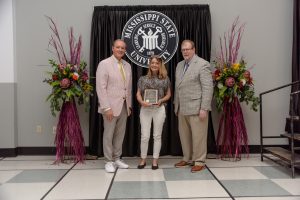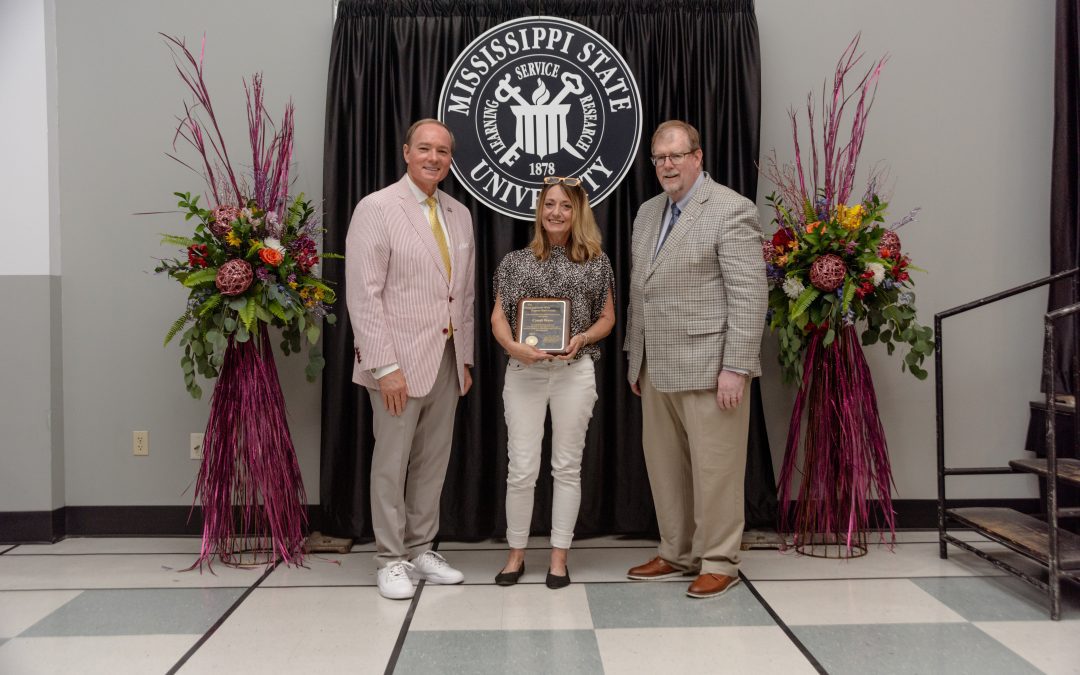
Cyndi Ware, center, is a senior research associate at the Thad Cochran National Warmwater Aquaculture Center at Delta Research and Extension Center in Stoneville. She earned the Lewis and Doris Wise Award from MSU’s Division of Agriculture, Forestry, and Veterinary Medicine. The award is given to DAFVM staff members who show superior service to others, effectiveness in the accomplishment of goals, untiring and patient support for each other, and high ethical standards. MSU President Mark Keenum and DAVFM Vice President Keith Coble presented Ware with the award this fall.
High levels of parasites in pondwater can result in catastrophic losses for Mississippi’s catfish producers, especially in the spring, but Cyndi Ware, a Mississippi State senior research associate at the university’s Delta Research and Extension Center in Stoneville, is helping prevent such disasters.
The myxozoan parasite Henneguya ictaluri causes proliferative gill disease in catfish, otherwise known as “hamburger gill.” The parasite is shed from worms that live in pond muds and can be fatal to catfish at high concentrations. Parasite levels in the water peak in April and May, which often coincides with springtime stocking. To avoid catastrophic losses, catfish producers’ best management solution is to avoid stocking ponds with high parasite concentrations in the water, said Matt Griffin, a research professor at DREC’s Thad Cochran National Warmwater Aquaculture Center, or NWAC.
That leads producers to Griffin’s lab where Ware tests producers’ pondwater samples and helps determine whether it’s safe to restock. “We have several producers who rely on Cyndi’s expertise in that regard to dictate their springtime stocking schedules,” Griffin said.
Between May and June, Ware will test 300-500 pondwater samples, and she strives to return results to producers within 24 hours.
This dedication earned Ware the Lewis and Doris Wise Award this past year from MSU’s Division of Agriculture, Forestry, and Veterinary Medicine. The award is given to DAFVM staff members who show superior service to others, effectiveness in the accomplishment of goals, untiring and patient support for each other, and high ethical standards.
“She leads by example, and she’s a good role model for students. She exemplifies, I think, the values of the award,” said Griffin, who nominated Ware, having worked with her since he was a doctoral student.
Over the course of her 27 years with MSU, Ware has become a jack-of-all trades in the lab. She helps with fish husbandry, disease challenges, feeding, cleaning and field sampling. She helps train research associates and students, but she’s also a beloved member of the staff because of her work outside the lab.
Griffin’s lab is highly diverse, with students from both domestic and international backgrounds originating from all corners of the globe. Ushering students from as far as Nepal through the NWAC facilities is a point of pride for Ware.
“Being so far from home can feel so isolating,” Ware said. “I just want them to feel comfortable, and I want the lab to be the least of their worries.”
Divya Rose, a doctoral candidate at NWAC, experienced this care firsthand.
“Being an international student, Cyndi has been more than a guide or co-worker for me,” Rose said. “I call her my ‘Mom away from home.’ She is a great friend who is always ready to listen and to lend a helping hand to our problems even outside the laboratory setting.”
Post-doctoral fellowNoor Ul-Huda also considers Ware both a colleague and a mother figure.
“From training me in the lab to polishing my driving skills, she made sure that I am making the right decisions,” Ul-Huda said. “She is my go-to person definitely and also an asset to DAVFM given the untiring years of service she has in the Delta.”
Griffin added that Ware makes the lab and its students what it is today.
“The reason it works is because of the efforts she puts in. I can count on her,” he said. “She’s generous with her time and patience. She helps make this place a home away from home. I don’t know what we’d do without her.”
Delta Research and Extension Center was established in 1904, and now the complex encompasses nearly 5,000 acres. DREC seeks to increase the yields of commercial agriculture and aquaculture producers through applied research, while at the same time preserving the Mississippi Delta’s environment and natural resources. Mississippi State University is taking care of what matters. Learn more at www.msstate.edu.

